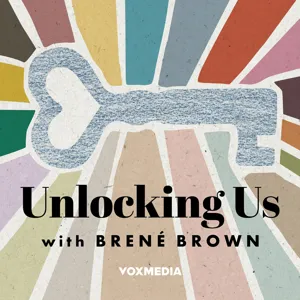Podcast Summary
Understanding Accountability vs. Shame: Apple Card offers daily cashback and savings account growth, Juntos celebrates Latine culture on Amazon Prime, and Brené Brown discusses accountability vs. shame in her podcast.
Apple Card offers daily cashback of up to 3% on every purchase, which can be grown at a 4.50% annual percentage yield when you open a savings account. Meanwhile, Juntos, a platform by PopSugar, celebrates Latine culture and offers content related to movies, TV shows, music, and shopping, available on Amazon Prime. On a deeper note, in her podcast "Unlocking Us," Brené Brown discusses the importance of understanding the difference between accountability and shame. Shame is a universal emotion, but we often avoid discussing it, which gives it more power. Shame is the fear of disconnection and the fear of not being good enough. It's essential to recognize the difference between being held accountable for our actions and feeling shame as a result. By understanding this distinction, we can better navigate the process of growth and self-improvement.
Understanding the Complexity of Shame: Shame is a universal emotion causing feelings of worthlessness and disconnection, often leading to physical pain. Distinguishing it from related emotions like guilt, humiliation, and embarrassment can help in healing and coping.
Shame is a painful experience of believing we are flawed and unworthy of love, belonging, and connection. It's not limited to those who have experienced significant trauma, but rather a common emotion that many people encounter daily. Shame can manifest in various areas of life, including appearance, money, work, family, health, addiction, sex, aging, and religion. Neuroscience research shows that the pain of social rejection and disconnection from shame is real and comparable to physical pain. Defining and understanding shame is challenging due to the lack of clear vocabulary and the tendency to use words like shame, guilt, humiliation, and embarrassment interchangeably. This lack of emotional granularity can hinder our ability to build resilience and move through shame. It's essential to differentiate these emotions to effectively cope with and heal from shame.
Differentiating Shame and Guilt: Shame and guilt have distinct self-talk patterns. Shame involves negative identity statements, while guilt focuses on wrong behaviors. Shame proneness increases risk for negative outcomes, while guilt proneness acts as a protective factor.
Understanding and distinguishing between emotions such as shame, guilt, embarrassment, and self-talk is crucial for mental health and well-being. Shame and guilt, in particular, can be differentiated by the focus of self-talk. Shame is characterized by self-deprecating statements that define a person's identity, while guilt focuses on the specific behavior that was wrong. This distinction is essential because it affects our proneness to various negative outcomes, such as addiction, depression, anxiety, and violence. Shame proneness is highly correlated with these issues, while guilt proneness acts as a protective factor. Shaming as a method of moral guidance is misguided, as it can hinder the ability to change and grow. Instead, focusing on specific behaviors and separating them from our identity can lead to better outcomes.
Understanding Guilt and Shame: Guilt can motivate positive change, but shame can be destructive. Build self-worth and create a supportive environment for growth instead.
Guilt and shame are complex emotions that can lead to meaningful change when experienced in a healthy way. Guilt, which arises from a sense of having acted inconsistently with our values or who we want to be, can motivate positive change through psychological discomfort. Shame, on the other hand, which involves a sense of being flawed or deserving of contempt, can be destructive and traumatizing, especially when experienced as humiliation in public settings. It's important to recognize the difference between these emotions and to avoid using shame as a tool for change, as it can lead to long-term negative consequences. Instead, focusing on building a strong sense of self-worth and providing a supportive environment for growth can help individuals make meaningful changes in their behavior.
Using Humiliation vs Shame for Social Justice: New research shows humiliation can lead to violence, while shame can corrode belief in self-improvement and be destructive. Audre Lorde argues against using shame as a tool for change, instead focusing on accountability and growth.
Humiliation and shame are not the same, and shame is not an effective tool for social justice. Humiliation involves feeling undeserving of the situation, while shame is about feeling bad or guilty for something we've done. New research suggests that humiliation can lead to violence. Shame, on the other hand, can corrode the belief that we can improve and be destructive. Audre Lorde's essay "The Master's Tools Will Never Dismantle the Master's House" is a powerful critique of using shame as a tool for change, as it is inherently dehumanizing and a tool of oppression. Instead, focusing on accountability and growth can lead to more productive and just outcomes.
Understanding Shame and Accountability: Approach accountability with self-awareness, empathy, and productive responses. Feelings of shame can foster growth, but being shamed harms relationships. Recognize privilege and mistakes without defensiveness, and regulate emotions to promote social justice.
It's important to approach accountability for personal growth and understanding of systemic issues with self-awareness and empathy. The discussion highlights the difference between feeling shame and being shamed. While feeling shame can be a productive emotion for personal growth, being shamed can lead to harmful consequences. In the context of addressing racism, it's crucial for individuals to recognize their privilege and mistakes without defensiveness or demanding absolution from marginalized communities. Instead, it's essential to regulate emotions and use productive responses to move forward. The example of the Apple Card rewards emphasizes the potential benefits of daily cashback rewards, while the discussion on shame and accountability serves as a reminder for responsible emotional regulation and social justice.
Experiencing shame can hijack our thinking brain, but sharing stories and reflecting on biases can help regulate shame and promote growth.: Sharing stories and reflecting on biases can help regulate shame and promote personal and societal growth by challenging internalized harmfull beliefs and learning more compassionate ways of interacting with the world.
When we experience shame, our prefrontal cortex, the part of the brain responsible for rational thinking and organization, can be hijacked by the limbic system, leading to a fight, flight or freeze response. To regulate shame and get our thinking brain back online, it's important to acknowledge and tell stories about our experiences with shame, especially as they relate to topics like racism, sexism, homophobia, and heterosexism. By sharing stories and reflecting on our biases, we can begin to unlearn harmful beliefs and learn more compassionate ways of interacting with the world. This process can be painful, but it's necessary for personal and societal growth. Additionally, recognizing and challenging our own internalized biases is crucial for creating a more equitable and inclusive world.
Exploring Biases and Beliefs: Be aware of personal biases and beliefs, seek feedback and accountability, question reactions, and strive for growth with a courageous mindset.
It's important to be aware of our own biases and beliefs, even if they make us uncomfortable. The speaker emphasizes the need to be open to feedback and accountability, and to be willing to transform and learn from our mistakes. She also encourages us to question our reactions and consider if they are rooted in fear or armor, and to strive to get things right rather than being right. The use of personal anecdotes and metaphors, such as the blind spot indicators and the armoring up process, helps illustrate these concepts. Ultimately, the speaker encourages us to approach life with courage and a growth mindset, recognizing that we all have room to learn and grow.
Recognizing and addressing shame responses for accountability: Identifying shame responses helps move towards accountability, resilience, and growth. Focus on action and change for authenticity and compassion.
When we're faced with accountability for our actions, especially when it comes to sensitive topics like racism, it's easy to fall into a defensive pattern of armoring up. This process can start with feelings of not being enough and can escalate to believing we're better than others. However, this stance only perpetuates pain and shame. Instead, recognizing and physically identifying our shame responses can help us move towards accountability and resilience. By focusing on action and making changes, we can emerge from shame experiences with more courage, compassion, and authenticity. Remember, it's essential to acknowledge and learn from our mistakes, rather than trying to blame others or deny the situation.
Shame hinders empathy: Shame makes it hard to connect with others and practice empathy, so recognizing and regulating it is crucial for effective communication and promoting love and justice. Accountability is important for personal growth and anti-racism practice, but avoid using shame as a tool.
Shame and empathy are incompatible emotions. Shame, being an egocentric and self-involved emotion, hinders our ability to practice empathy, which is other-focused. When we feel shame, our focus shifts inward, making it difficult to understand and connect with others' experiences. This is why recognizing and regulating shame is crucial for effective communication and promoting love and justice. Additionally, accountability is essential for personal growth and anti-racism practice, but it can be uncomfortable and may lead to feelings of shame. It's essential to acknowledge these feelings, regulate them, and avoid using shame as a tool for social justice. Instead, focus on empathy, understanding, and learning from our mistakes to foster growth and positive change.
The Power of Accountability in Effective Communication and Leadership: Accountability involves holding ourselves and others responsible for actions and decisions, recognizing the difference between accountability and shame, and communicating effectively. It creates a positive culture and leads to solutions.
Accountability is a crucial aspect of effective communication and leadership. It involves holding ourselves and others responsible for our actions and decisions, rather than resorting to shame and blame. Shame, on the other hand, is a destructive force that can hinder progress and prevent us from working together towards solutions. It's essential to recognize the difference between the two and strive for accountability in our interactions. Brene Brown, in her podcast, emphasizes the importance of accountability in addressing complex issues, such as the COVID-19 crisis. She encourages citizens to hold their leaders accountable for making evidence-based decisions and taking science into consideration. At the same time, she emphasizes the need to communicate accountability in a respectful and constructive manner, without resorting to name-calling or humiliation. Moreover, accountability starts with regulating our emotions and taking responsibility for our own shame. By acknowledging and addressing our shame, we can become more effective communicators and leaders, and create a culture of accountability that benefits everyone. In summary, accountability is a powerful tool for creating positive change and addressing complex challenges. It requires us to communicate effectively, hold ourselves and others responsible for our actions, and regulate our emotions. By embracing accountability, we can work together towards solutions and create a more compassionate and effective society.






